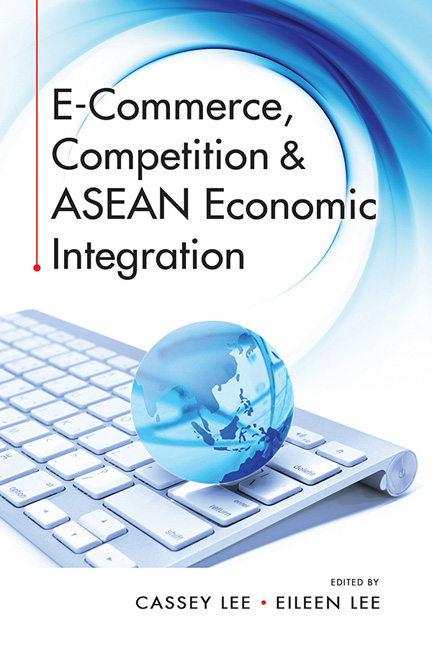Book contents
- Frontmatter
- Contents
- Acknowledgements
- About the Contributors
- 1 Introduction
- PART I
- PART II
- PART III
- PART IV
- 5 E-commerce and its Development in Thailand
- 6 E-commerce Development in Indonesia: Challenges and Prospects
- 7 Development of E-commerce in Malaysia
- 8 E-commerce in Singapore: Current State, Policies and Regulations
- 9 Competition and E-commerce in the Philippines
- 10 Vietnam: E-commerce Market Overview and Trends
- Index
8 - E-commerce in Singapore: Current State, Policies and Regulations
from PART IV
Published online by Cambridge University Press: 31 January 2020
- Frontmatter
- Contents
- Acknowledgements
- About the Contributors
- 1 Introduction
- PART I
- PART II
- PART III
- PART IV
- 5 E-commerce and its Development in Thailand
- 6 E-commerce Development in Indonesia: Challenges and Prospects
- 7 Development of E-commerce in Malaysia
- 8 E-commerce in Singapore: Current State, Policies and Regulations
- 9 Competition and E-commerce in the Philippines
- 10 Vietnam: E-commerce Market Overview and Trends
- Index
Summary
Introduction
Singapore has a highly developed and open economy. The country, which has the highest gross domestic product (GDP) per capita in Southeast Asia, is also well-known for its corruption-free environment. The main drivers of the growth of the Singaporean economy include the manufacturing, finance and insurance sectors (Ministry of Trade and Industry 2017). The Singapore population is highly educated and tech-savvy, with a literacy rate of 97.0 per cent amongst residents aged 15 years and above (Department of Statistics Singapore n.d.), and 84 per cent of the population are internet users in 2016 (IMDA 2018). The Singapore government has encouraged Singaporean businesses to venture into overseas markets by taking advantage of new opportunities in the digital economy and build strong capabilities in innovation and enterprise (Budget 2017). These conditions make Singapore a conducive environment for the growth and development of e-commerce.
This chapter provides an analysis of the current state of e-commerce in Singapore from a number of perspectives. The outline of this chapter is as follows. After defining e-commerce in Section 2, the state of e-commerce infrastructure is discussed in Section 3. The size of Singapore's e-commerce is examined in Section 4. The evolution of e-commerce in terms of the major players in the industry is discussed in Section 5. Government policies, as well as the laws and regulations governing e-commerce in the country, are covered in Sections 6 and 7, respectively. Competition law and policy-related issues are discussed in Section 8. Factors that can impede and restrict the opportunities for e-commerce growth in Singapore are discussed in Section 9. Finally, Section 10 concludes by presenting policy recommendations for the further development of e-commerce in Singapore.
Defining E-commerce
E-commerce refers to the sale and purchase of goods and services over the internet and includes ancillary activities which support such transactions. E-commerce transactions can take place between businesses and consumers (B2C), between businesses (B2B) or between the government and businesses (G2B); between consumers (C2C) whereby consumers buy and sell directly to each other through platforms such as eBay; as well as between the government and citizens via the offering of e-Government services.
- Type
- Chapter
- Information
- E-Commerce, Competition and ASEAN Economic Integration , pp. 193 - 231Publisher: ISEAS–Yusof Ishak InstitutePrint publication year: 2019



